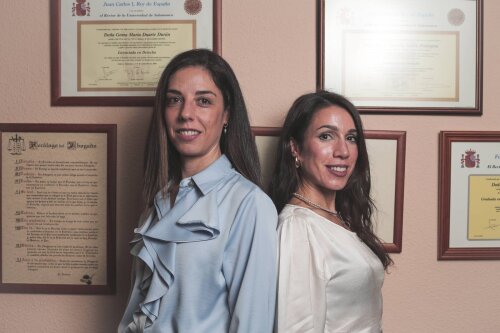Best Renewable & Alternative Energy Lawyers in Madrid
Share your needs with us, get contacted by law firms.
Free. Takes 2 min.
List of the best lawyers in Madrid, Spain
About Renewable & Alternative Energy Law in Madrid, Spain
Madrid, as the vibrant capital of Spain, plays a significant role in the national shift toward renewable and alternative energy sources. Renewable energy law in Madrid encompasses the legal frameworks, regulations, and policies that govern the production, distribution, and use of clean energy like solar, wind, biomass, hydroelectric, and geothermal resources. With Spain’s commitment to the European Union’s climate targets, as well as its own renewable energy goals, Madrid has actively promoted the development of sustainable energy projects. The legal landscape is evolving to support investment, ensure compliance, safeguard environmental interests, and enable energy transition in both the public and private spheres.
Why You May Need a Lawyer
Navigating renewable and alternative energy issues can be complex due to evolving regulations and the involvement of multiple authorities. Common situations where legal assistance is vital include:
- Securing permits and licenses for renewable energy installations such as solar panels or wind turbines.
- Understanding and negotiating feed-in tariffs, power purchase agreements, or other commercial contracts.
- Compliance with zoning, environmental, and urban development regulations.
- Resolving disputes related to land use, easements, or grid connection.
- Managing risks related to investment, financing, and public subsidies.
- Addressing intellectual property, technology licensing, and innovation agreements.
- Representing clients in administrative proceedings or litigation involving regulatory bodies.
Whether you are an individual, a business, or a developer, seeking timely legal advice ensures you meet obligations, seize incentives, and avoid costly mistakes or delays in your renewable energy endeavors.
Local Laws Overview
Madrid is governed by both national Spanish laws and regional regulations specific to the Community of Madrid. The primary legal framework for renewables includes:
- National Renewable Energy Law (Real Decreto 413/2014): This law establishes the legal regime for electricity production from renewable sources in Spain, including procedures for registration, operation, and incentives.
- Energy Transition and Climate Change Laws: Spain’s Climate Change and Energy Transition Law (Ley 7/2021) sets ambitious targets, requiring a high proportion of energy production from sustainable sources by 2030 and 2050, affecting both Madrid’s public and private sectors.
- Regional Regulations of Madrid: Madrid’s autonomous authorities provide additional rules on urban planning, environmental protection, and local subsidies or incentives for renewable projects.
- Grid Access and Connection: Rules on access to and connection with the electricity grid are crucial for renewable energy producers and are regulated at both national and local levels.
- Environmental Impact Assessments: Most large projects require comprehensive environmental studies and approval before commencement, ensuring minimal impact on the environment.
Keeping up with amendments, new initiatives, and the interplay between national and local laws is essential, making legal guidance invaluable.
Frequently Asked Questions
What types of renewable energy projects are most common in Madrid?
Photovoltaic solar installations, both residential and commercial, are highly popular due to Madrid’s climate. Wind and biomass projects are also present, along with small-scale hydroelectric initiatives.
Do I need a permit to install solar panels on my property in Madrid?
Most installations require some form of permit or notification to municipal authorities, particularly for grid-connected systems or installations affecting building structure or aesthetics.
What financial incentives exist for renewable energy projects?
There are various incentives, grants, and subsidies available from both the central government and the Madrid regional authorities to promote renewable installations. These incentives change frequently based on funding and policy priorities.
Are there restrictions on where I can install renewable energy systems?
Yes, zoning laws, building codes, and environmental regulations may restrict certain types of installations, especially in protected areas or historical districts. Always consult local requirements before starting a project.
How are disputes about renewable energy developments resolved?
Most disputes are first handled through administrative procedures with the relevant authorities. Litigation before the administrative courts or alternative dispute resolution methods like arbitration are also available.
What is the process for connecting my renewable energy system to the grid?
You must apply for grid access with the local electricity operator, comply with technical requirements, and possibly pay certain fees. Legal help can ensure a smooth and compliant process.
Can communities or cooperatives develop shared renewable energy projects?
Yes, community and cooperative projects are legally permissible and increasingly encouraged. They are subject to specific regulations regarding participation, management, and revenue sharing.
How are renewable energy purchase agreements regulated?
Power Purchase Agreements (PPAs) must comply with Spanish law, including terms covering delivery, pricing, duration, and obligations of parties. Specialized legal advice is recommended for contract negotiation and drafting.
What are my obligations regarding the environment when developing a renewable energy project?
Developers are required to perform environmental assessments for most sizable projects, minimize impact, and comply with waste, noise, and emissions regulations set at national and regional levels.
Where can I find information on current renewable energy laws and incentives in Madrid?
Official information is published by relevant government departments and agencies. Consulting a qualified lawyer ensures you have the latest and most applicable guidance for your circumstances.
Additional Resources
For further guidance and updated information, consider the following resources:
- Ministry for the Ecological Transition and the Demographic Challenge (MITECO): Responsible for Spain’s renewable energy policy and regulation.
- Regional Government of Madrid (Comunidad de Madrid): Provides information on local incentives, permits, and regulations for renewables.
- Municipal Energy Agencies: Local agencies in Madrid offer advice and support for small-scale renewable installations.
- Spanish Photovoltaic Union (UNEF): Industry group providing resources and support for solar energy stakeholders.
- Institute for Diversification and Saving of Energy (IDAE): Offers technical and financial advice on sustainability and renewable projects in Spain.
Next Steps
If you are considering developing, investing in, or participating in a renewable or alternative energy project in Madrid, taking the following steps can help you navigate the legal complexities:
- Evaluate the scope of your project and identify potential legal concerns early on.
- Consult qualified legal professionals experienced in renewable and alternative energy law in Madrid.
- Gather all necessary documentation related to land use, permits, grid connection, and financing.
- Stay informed by regularly reviewing updates from government agencies and reputable industry associations.
- If a dispute or complex legal issue arises, seek targeted legal representation to protect your interests.
Legal requirements in the field of renewable and alternative energy are constantly evolving. Prompt legal advice will help you comply with existing laws, take advantage of available incentives, and ensure the successful implementation of your sustainable energy project in Madrid.
Lawzana helps you find the best lawyers and law firms in Madrid through a curated and pre-screened list of qualified legal professionals. Our platform offers rankings and detailed profiles of attorneys and law firms, allowing you to compare based on practice areas, including Renewable & Alternative Energy, experience, and client feedback.
Each profile includes a description of the firm's areas of practice, client reviews, team members and partners, year of establishment, spoken languages, office locations, contact information, social media presence, and any published articles or resources. Most firms on our platform speak English and are experienced in both local and international legal matters.
Get a quote from top-rated law firms in Madrid, Spain — quickly, securely, and without unnecessary hassle.
Disclaimer:
The information provided on this page is for general informational purposes only and does not constitute legal advice. While we strive to ensure the accuracy and relevance of the content, legal information may change over time, and interpretations of the law can vary. You should always consult with a qualified legal professional for advice specific to your situation.
We disclaim all liability for actions taken or not taken based on the content of this page. If you believe any information is incorrect or outdated, please contact us, and we will review and update it where appropriate.















